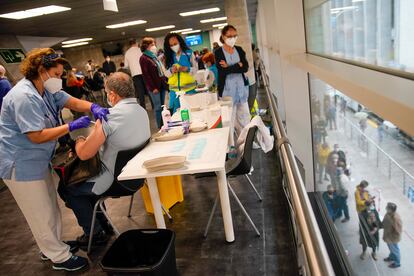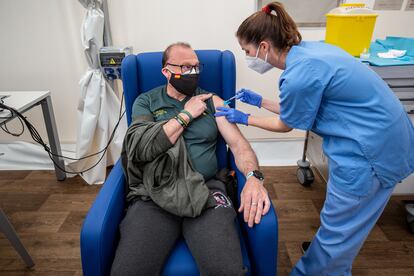Madrid reports major rise in missed vaccination appointments fueled by doubts over AstraZeneca
Other regions, meanwhile, say that there has been no drop in attendance, with a record 453,682 inoculations administered across Spain on Wednesday alone

The changing criteria for the use of Oxford-AstraZeneca in Spain is eroding the trust of the public in the Covid-19 vaccine. This week saw two modifications to the age groups that will receive the shots in the space of just 24 hours, given the fears that the medication could be linked to a tiny number of rare blood clots registered in the inoculation campaign so far. On Wednesday the Spanish authorities decided they would use the vaccine for the 60-65 group, only to do a U-turn and opt for the 60-69 group the following day. The Madrid deputy health chief, Antonio Zapatero, claimed on Friday that of the 29,000 appointments scheduled for Thursday in the Zendal Hospital and the Wanda Metropolitano stadium, just a third – 10,800 people – turned up. The previous week such missed appointments only accounted for 3% of the total.
The doubts about the Anglo-Swedish vaccine are also being felt in some regions of Spain, albeit not as keenly as in Madrid. A report from Friday, which contained data from the day before, showed a negligible effect on the campaign across the country, with a total of 420,296 Covid-19 vaccines administered. That’s the second-highest figure of the campaign so far, with 453,682 injections recorded on Wednesday. According to the data Madrid went from 47,919 injections to 40,622. The general fall across the country was 7%, half that seen in Madrid.
There are people who believe the AstraZeneca vaccine to be bad, when the bad thing is to not take itInmaculada Cuesta, from the vaccines group at the General Council of Nursing,
Regions such as the Canary Islands, Aragón, Galicia and Castilla y León report that there has been no fall in the number of people coming for their vaccines, despite the latter having suspended the use of the AstraZeneca shots even before the European Medicines Agency (EMA) announced its conclusions about possible links to rare blood clots.
Murcia, meanwhile, and Catalonia said that there had been “some cases” of rejection of the shot in the case of the former, and “a fall in the rhythm of appointments” in the case of the latter. Andalusia reported that there seemed to have been some falls in certain provinces, such as Cádiz, while in others, such as Jaén, there was no difference. Castilla-La Mancha reported on Friday a fall of 15.5% in appointments.

Given this situation, the experts are all in agreement. Inmaculada Cuesta, from the vaccines group at the General Council of Nursing, says that “there is more uncertainty than fear, a lot of disorientation and misinformation.” She adds: “There are people who believe the AstraZeneca vaccine to be bad, when the bad thing is to not take it.”
This perception, that there are good and bad vaccines, has also been rejected by Carmen Cervera, the secretary of the Spanish Immunology Society, who has no doubt that there has been an impact on the public due to so many controversial decisions. “We have to insist on what is important, which is that in less than a year we will have four vaccines that, from the first dose, will be avoiding Covid deaths, which is the objective,” she says.
Despite the fears, the majority of people cited across Spain are turning up for their vaccine. Paloma Martínez, aged 61, arrived on time for her appointment at the Wanda Metropolitano stadium in Madrid on Thursday. She was convinced that she would be given the AstraZeneca shot, but said that she was relaxed about it. “I have spoken to my doctor because I have had a number of mini-strokes but she told me that there is no problem,” she said. “I have opted to get information and not to be swayed by any news stories I’ve seen. I’m sure that everything is going to be fine. I’ll finally be able to hug my children and my grandchildren!”
What the data says
This week saw the EMA confirm that among the possible side effects of the AstraZeneca vaccine there could be “very rare” cases of blood clots, EL PAÍS data expert Kiko LLaneras reports. The authority insisted, however, that the risk is very small and that the use of the vaccine should continue. The British authorities, meanwhile, have concluded the same and have recommended that the under-30s be given a different vaccine given that the effects of Covid-19 are less serious in that age group.
The EMA puts the risk of blood clots as one case in every 100,000 people vaccinated, while the British authorities estimate one in 250,000, and vary this rate according to age. On the basis of this data, the risk of suffering a blood clot after having the vaccine is:
- 20-29 years: Risk of 2 in 100,000
- 30-39 years: Risk of 1.5 in 100,000
- 40-49 years: Risk of 1 in 100,000
- 50-59 years: Risk of 0.8 in 100,000
- 60-69 years: Risk of 0.5 in 100,000
Meanwhile, according to estimates by Imperial College, one in every 166 people with Covid-19 die, a rate of 0.6% – although the lethality of the virus is, of course, very different according to age:
- 20-29 years: Risk of 30 in 100,000
- 30-39 years: Risk of 75 in 100,000
- 40-49 years: Risk of 200 in 100,000
- 50-59 years: Risk of 450 in 100,000
- 60-69 years: Risk of 1,000 in 100,000
- +90 years: Risk of 15,000 in 100,000 (1 in 6)
The conclusions based on this data are that the risk of dying from Covid-19 are much higher than that of suffering a rare blood clot after receiving the vaccine. For those aged 60 to 69, the risk is 2,000 times greater. The vaccine also reduces the risk by a factor of 10 for someone who is aged 25 years old.
Tu suscripción se está usando en otro dispositivo
¿Quieres añadir otro usuario a tu suscripción?
Si continúas leyendo en este dispositivo, no se podrá leer en el otro.
FlechaTu suscripción se está usando en otro dispositivo y solo puedes acceder a EL PAÍS desde un dispositivo a la vez.
Si quieres compartir tu cuenta, cambia tu suscripción a la modalidad Premium, así podrás añadir otro usuario. Cada uno accederá con su propia cuenta de email, lo que os permitirá personalizar vuestra experiencia en EL PAÍS.
¿Tienes una suscripción de empresa? Accede aquí para contratar más cuentas.
En el caso de no saber quién está usando tu cuenta, te recomendamos cambiar tu contraseña aquí.
Si decides continuar compartiendo tu cuenta, este mensaje se mostrará en tu dispositivo y en el de la otra persona que está usando tu cuenta de forma indefinida, afectando a tu experiencia de lectura. Puedes consultar aquí los términos y condiciones de la suscripción digital.








































